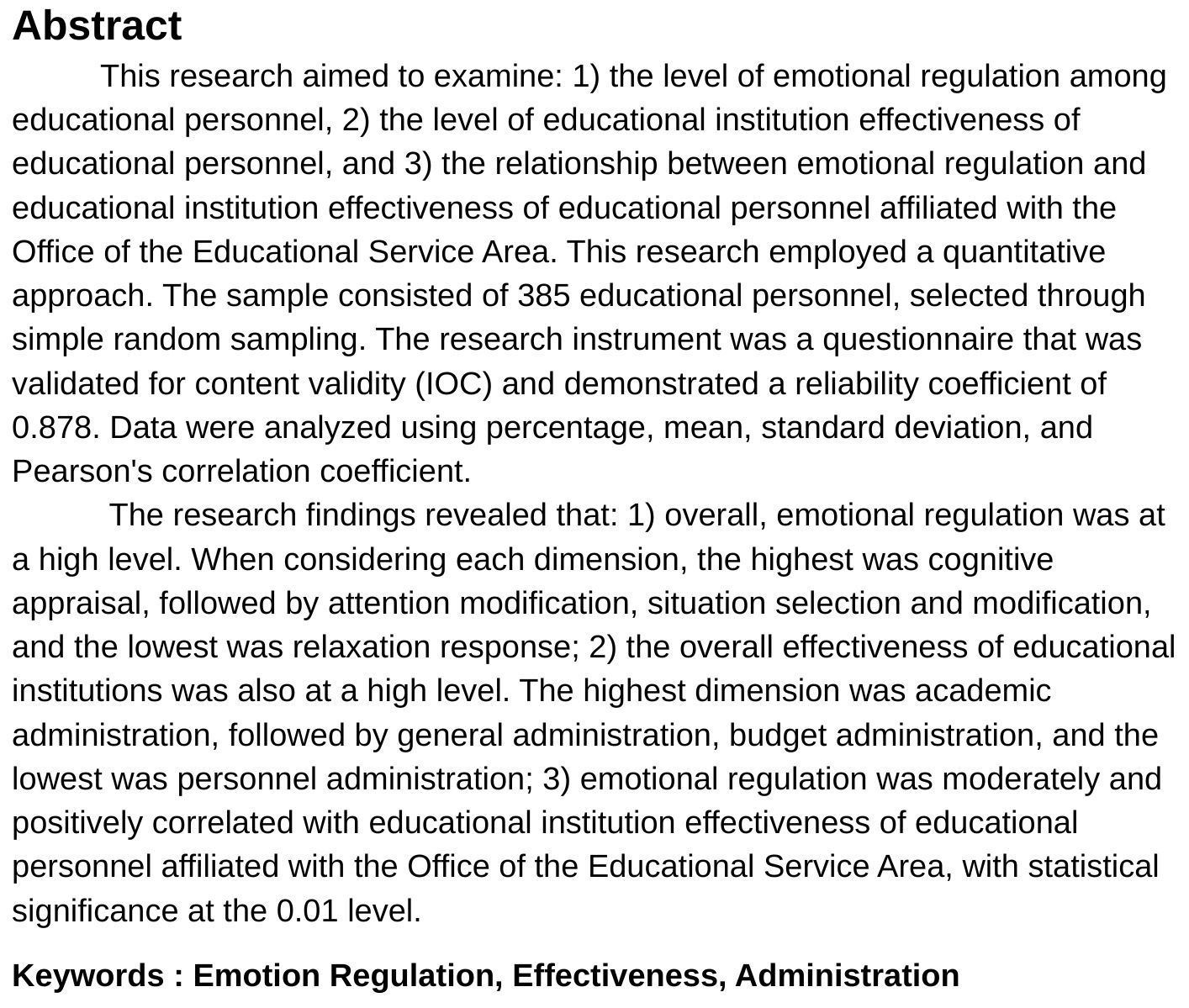Emotional regulation and educational institution effectiveness of educational personnel, affiliated with the Office of the Educational Service Area
Keywords:
Emotion Regulation, Effectiveness, AdministrationAbstract
This research aimed to examine: 1) the level of emotional regulation among educational personnel, 2) the level of educational institution effectiveness of educational personnel, and 3) the relationship between emotional regulation and educational institution effectiveness of educational personnel affiliated with the Office of the Educational Service Area. This research employed a quantitative approach. The sample consisted of 385 educational personnel, selected through simple random sampling. The research instrument was a questionnaire that was validated for content validity (IOC) and demonstrated a reliability coefficient of 0.878. Data were analyzed using percentage, mean, standard deviation, and Pearson's correlation coefficient.
The research findings revealed that: 1) overall, emotional regulation was at a high level. When considering each dimension, the highest was cognitive appraisal, followed by attention modification, situation selection and modification, and the lowest was relaxation response; 2) the overall effectiveness of educational institutions was also at a high level. The highest dimension was academic administration, followed by general administration, budget administration, and the lowest was personnel administration; 3) emotional regulation was moderately and positively correlated with educational institution effectiveness of educational personnel affiliated with the Office of the Educational Service Area, with statistical significance at the 0.01 level.
References
กรกนก วงศ์กัลยา และ ประเสริฐ อินทร์รักษ์. (2567). ความฉลาดทางอารมณ์ของผู้บริหารสถานศึกษากับการทำงานเป็นทีมของครูในสถานศึกษา สังกัดสำนักงานเขตพื้นที่การศึกษาประถมศึกษาสมุทรสงคราม. วารสารธรรมเพื่อชีวิต, 30(1), 201-220.
กรมสุขภาพจิต กระทรวงสาธารณสุข. (2554). เครื่องชี้วัดคุณภาพชีวิตขององค์กรอนามัยโลกชุดย่อ. ฉบับภาษาไทย. [ออนไลน์]. แหล่งที่มา : http://www.dmh.go.th/test/whoqol/ [2 ธันวาคม 2567].
ธัชยพงศ์ ปาละหงษา, วิชาญ เหรียณวิไลรัตน์ และ ในตะวัน กำหอม. (2565). ความสัมพันธ์ของปัจจัยเชิงสาเหตุกับประสิทธิผลการบริหารของบุคลากรทางการศึกษา โรงเรียนชุมชนประชาธิปัตย์วิทยาคาร สำนักงานเขตพื้นที่การศึกษาประถมศึกษาปทุมธานี เขต 2. วารสารวิชาการรัตนบุศย์, 4(3), 151-162.
ธัญพร หิรัญธนยรัศมี และ วรกาญจน์ สุขสดเขียว. (2561). ความฉลาดทางอารมณ์กับการใช้อำนาจของผู้บริหารสถานศึกษา สังกัดสำนักงานเขตพื้นที่การศึกษาประถมศึกษานนทบุรี เขต 2. วารสารการบริหารการศึกษา มหาวิทยาลัยศิลปากร, 10(1), 434-445.
นิพิธิดา ชำนาญกุล. (2561). การเสริมสร้างการกำกับอารมณ์ของพนักงานต้อนรับบนเครื่องบินโดยการให้คำปรึกษา แบบกลุ่มตามแนวคิดพิจารณาเหตุผล อารมณ์และพฤติกรรม. ปริญญานิพนธ์ศึกษาศาสตร์มหาบัณฑิต. บัณฑิตวิทยาลัย : มหาวิทยาลัยศรีนครินทรวิโรฒ.
ในตะวัน กำหอม. (2559). การวิจัยทางการศึกษา.เล่ม 1. กรุงเทพฯ : วิทยาลัยทองสุข. โรงพิมพ์ทีคอม.
เมรินทกาล พัฒนทรัพย์พิศาล. (2560). ปัจจัยการบริหารที่ส่งผลต่อประสิทธิผลโรงเรียน สังกัดสำนักงานเขตพื้นที่การศึกษามัธยมศึกษา เขต 23. วิทยานิพนธ์ปริญญามหาบัณฑิต สาขาวิชาการบริหารการศึกษา : มหาวิทยาลัยราชภัฏสกลนคร.
สุฑาทิพย์ มณีรัตนเลิศวานิช และ นิมิตร มั่งมีทรัพย์. (2562). ความฉลาดทางอารมณ์ของผู้บริหารที่ส่งผลต่อผลการ สื่อสารภายในสถานศึกษา สังกัดสำนักงานเขตพื้นที่การศึกษาประถมศึกษาราชบุรี เขต 1. วารสารสังคมศาสตร์วิจัย, 10(2), 99-112.
Best, J.W. and Kahn, J.V. (2006). Research in Education. 10th Edition. Cape Town : Pearson Education Inc.
Corey, G. (2008). Theory and practice of group counseling. California : Thompson Brook Cole Inc.
Goleman, D. (1998). Working with Emotional Intelligence. London : Bloomsbury.
Krejcie, R.V. and Morgan, D.W. (1970). Determining Sample Size for Research Activities. Educational and Psychological Measurement, 30(3), 607-610.
Mayer, J.D. and Salovey, P. (1997). What Is Emotional Intelligence? Emotional Development and Emotional Intelligence: Implications for Educators. New York : Basic Books.
Roderick, A. Baron. (1997). Psychology The Essential Science. Boston : Renslaer Polytechnic Institute.

Downloads
Published
How to Cite
Issue
Section
License
Copyright (c) 2025 Institute of Sufficiency Journal

This work is licensed under a Creative Commons Attribution-NonCommercial-NoDerivatives 4.0 International License.



